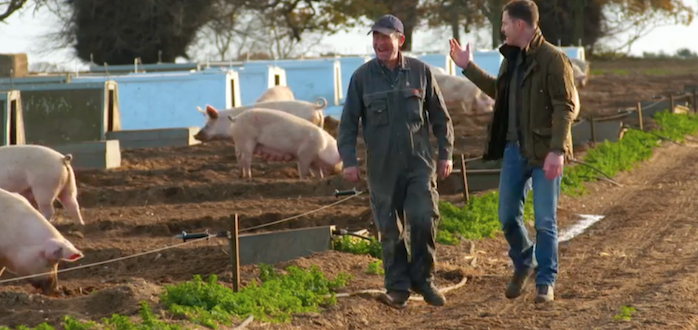“The BBC Countryfile people have been on; they’re planning a programme based on the Brecklands. We need it to show there is economic activity here, not just bunny rabbits and stone curlews.” That’s how it started.
Having established that it wouldn’t be the bloke off Panorama or the grumpy old man who used to do Newsround and reputedly hates farmers, I was more interested. It would be the presenter who also fronts The One Show, whose parents have a small sheep farm. That sounded OK.
Then followed a reconnaissance visit from a director and a couple of phone calls from a researcher.On the appointed day they arrived: one director, one soundman, two cameramen and, to begin with, one presenter, five cars (very green) plus the root vegetable growers who had been filmed earlier. I was to find out why later.
A short interview kicked us off – covering the basics of why this land is good for outdoor pigs. The same conversation was then repeated from different camera angles, walking to the camera, away from the camera, standing still – including my small dig at sheep farmers having most of the year off, unlike pig farmers whose animals give birth all year round. The interviewer seemed to like that.
There then followed a few establishing shots and a bit of bedding up with some rather mouldy straw in some farrowing huts that didn’t need it. The interviewer did some links to the weather forecast and an establishing piece to camera.
Then we waited. She was due at 3.30pm. Who? One of the blonde presenters – so that’s why the vegetable boys had developed a keen interest in pigs!
Eventually she wafted in, for the filming of the programme’s end piece, where they meet up and have a bit of banter before closing the show. We did it in a small pen of recently weaned, homebred gilts, conveniently lending the feature a cuddle factor – without any danger of a very cross sow coming after the crew.
I asked the blonde one what she had been filming. “Rabbits that have been dying of a mysterious virus,” she said. I managed not to reply agriculturally with ‘why’s that a bad thing?’, but a much more on message ‘I’m sure that they’ll develop resistance, because they always seem to’. I was learning.
So it worked out OK, I think. Some might have been offended by my sheep farmer jibe – at least one has been in touch after the show aired, but hopefully he was joking.
Within five minutes of the programme ending, another friend picked me up on the cardboard straw that we were using to bed up.
Anyway, within the programme there was a far more serious and pertinent piece on the dangers of African swine fever spreading to us from mainland Europe, handled with his usual skill by Mick Sloyan. We are very fortunate that prime time television has a regular spot for agriculture.




